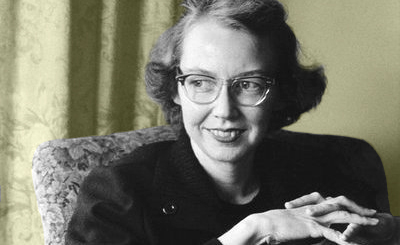
From 1955 until her death nine years later, Flannery O’Connor maintained a frank, wide-ranging and candid correspondence with Betty Hester, a clerk at an Atlanta-based credit union who had one day written O’Connor out of the blue. “I would like to know who this is,” O’Connor had responded, “who understands my stories.”
December 14, 1957, Milledgeville
Wal, I can’t argue with you or Caroline either about The Golden Bowl because haw haw I haven’t read it. She probably exalts James overmuch out of admiration for his technical achievements, and you sell him short for never having had temptations. Now I think it is a great grace to not be tempted. I used to have a Sweden-borgian friend who was very critical of the Lord’s Prayer. “Imagine,” said she, “asking not to be led into temptation! We should ask to be led into temptations so that we could grow strong and overcome them!” Which might be logical enough if we hadn’t been instructed otherwise by Christ Himself. Apparently after a while in his life, St. Thomas was relieved of all temptations of the flesh and certainly this was necessary if he was to write a Summa. James apparently knew nothing of any real religion. Graham Greene has an essay on this subject in The Lost Childhood but I forget exactly what his view of it was…
About the Lourdes business. I am going as a pilgrim, not a patient. I will not be taking any bath. I am one of those people who could die for his religion easier than take a bath for it. The one thing in France I have a real desire to see is Matisse’s chapel in Vence; but of course they won’t be going near any suchlike as that…By my calculation we should see more airports than shrines, and I suspect that if you’ve seen one shrine you’ve seen them all. Aside from penance being a good thing for us, I’m sure religion can be served as well at home. I’ll be glad when the 17 days are over. Also I am afraid I may miss the geese hatching. But back to the baths. If there were any danger of my having to take one, I would not go. I don’t think I’d mind washing in somebody else’s blood…but the lack of privacy would be what I couldn’t stand. This is neither right nor holy of me but it is what is. [1]
The time interfered with Chicago. It also interfered with an invitation to an Arts Festival in Colorado, where I’d like to go because I’ve never been there. I would have got 500 bucks for those two classes in Chicago, so even if I ain’t taking a bath, I figure I am making a financial sacrifice. On second thought, what a lousy conclusion!
I have torn the story [“The Enduring Chill”] up and am doing it over or at least a good deal of it over. It bids fair to be very long. Parts of it are very funny and it contains a memorable Jesuit, but I haven’t got it right yet. But I am anxious to send it to you & trust it will get there before Christmas. Also I am sending you a little book for Christmas…
+
FOOTNOTES
[1] O’Connor visited Lourdes in early 1958. In a letter to Elizabeth Bishop (dated 1 June 1958) she would describe her experience at Lourdes as follows:
“Lourdes was not as bad as I expected it to be. It is a beautiful village or would be if it weren’t pockmarked with religious junk shops-one right after the other in an unbroken chain right up to the entrance of the grotto. Here the heavy hand of the prelate smacks down on free enterprise and it’s a pity the whole town can’t be controlled the way the grotto is. Somebody in Paris told me the miracle at Lourdes is that there are no epidemics and I found this to be the truth. Apparently nobody catches anything. The water in the baths is changed once a day, regardless of how many people with running sores get into it. I went early in the morning and it was clean; sat in a long line of peasants to wait for my turn. They passed around a thermos bottle of Lourdes water and everybody had a drink out of the top. I had a nasty cold so I figured I left more germs than I took away. The sack you take the bath in is the same one the person before you took off, regardless of what ailed him. At least there are no society trappings along with the medieval hygiene. I saw nothing but peasants and was very conscious of the distinct odor of the crowd. The supernatural is a fact there but it displaces nothing natural; except maybe those germs.”


